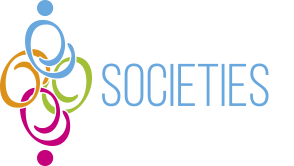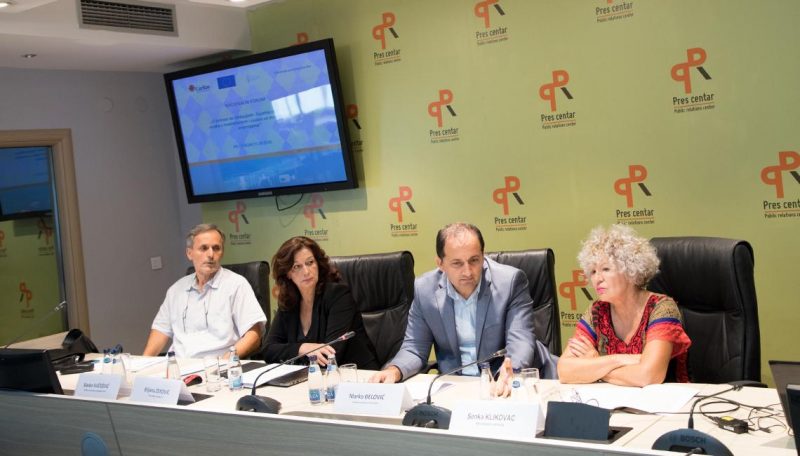The National forum on social inclusion “In search for inclusion” was organized on September 11, 2019 in Pres center in Podgorica. The Forum took a place within the framework of the SOCIETIES project, a regional project funded by the European Union. The forum addressed strategies, policies and recommendations for all stakeholders in the field of disability.
The director of Caritas Montenegro, Marko Djelovic, said that the project is mostly concerned with creating opportunities and a new framework for the social integration of PWDs and people with mental health problems.
“This project has been implemented already four years. It enters the final phase and lasts until the end of this year. It was implemented through several directions. One of the elements that we have implemented over this four-year period is the training available to civil society organizations to enhance their capacity for more active participation in this area, ”said Djelovic.
He said the second segment of the project was to promote the rights and opportunities of persons with disabilities and people with mental health problems through campaigns implemented yearly, on October 10th International Mental Health Day and December 3th International Day for PWD.”Last year we realized the campaign” Anyone can happen “, as well as the video” Tell me what I can, don’t tell me what I can’t “, said Djelovic.
He assessed prejudice and stigmatization as a major obstacle to the full inclusion and social integration of PWDs and people with mental health problems.
Advisor to the Minister of Health, Senka Klikovac, said that Montenegro and the health sector have a good normative framework, “but we can all wonder if they are being implemented the way they were adopted.”
” Lately, there has been a lot of youth in the Government and non-governmental sectors, but young people need to know that they have to read and be familiar with the norm, because not everyone is proficient in language. The most important thing is to know the system, “Klikovac pointed out.
According to her, with knowledge of the state system, “no one will have an obstacle to the implementation of the law.”Speaking about the Register of Persons with Disabilities, Klikovac recalled that it was envisaged in the Action Plan for 2020, “it was scheduled for this year, it is likely to be envisaged for next year”.
“Someone considers taht the registry to be under the jurisdiction of the Ministry of Health. We believe that the registry of persons with disabilities cannot be in the Ministry of Health’s office. The fact is that the health sector is healing, not keeping records. The records are kept by the Institute of Public Health, that is, the Registry of Diseases and other things in the health sector, “Klikovac said.
She explained that the registry does not only mean keeping records, “but also the competence of determining the disability of persons, determining the percentage of disability with the same body for all citizens of Montenegro who have disabilities and, on the basis of that unique document, that they can exercise all rights that are prescribed by all regulations, which is the goal of the state. ”
The director of the Association of Paraplegics Bar, Slavko Vucicevic, reminded that the SOCIETIES project has been implemented for four years, stating that a large number of activities were implemented during that period.
“The activities implemented within the project were very demanding and significant for the area of disability and for the overall improvement of the position of PWDs both individually and through civil society organizations,” Vucicevic said.
He said that there were also seven training sessions within the capacity building program of civil society organizations, which is a project activity within the project.
Vucicevic pointed out that for many years they have been trying to influence decision makers and policy makers to understand that it is necessary to form a single expert body in the area of disability.
“Today, we are faced with the situation that we are committed to reporting to various committees in the exercise of certain rights. These are commissions at the centers for social work, the commission of the Pension and Disability Insurance Fund, the commission of the labor bureau, and all this complicates the procedures and the process of exercising certain rights and the PWD represents a certain burden, ”said Vucicevic.
According to him, forming a single expert body would help PWDs and facilitate the process of exercising their rights in accordance with the legislation, and at the same time have a single database from which all authorities and institutions would draw data. ”
He estimated that the situation had improved, but that he said there was enough space to work on some improvements.
Ministry of Health representative, Mira Radovic, said that staff education in institutions is necessary, both in social and health institutions, stating that they are necessary in order to bring socialization to a higher level in order to facilitate the work of employees.
“These activities are ongoing. The project is being processed, so we can expect that these educations of our staff will start soon, ”Radovic said.
Biljana Zekovic, the executive director of SOS Telephone Podgorica, said, while presenting proposals for practical policies, we need to improve the social inclusion of persons with disabilities and mental disorders in Montenegro, members of working groups in eight Montenegrin cities worked out the ideas and actions that should be implemented in the future.
“This document is intended for the Government, state institutions and non-governmental organizations and provides a great tool for how the situation in this area can be improved. Members of the working groups were representatives of both the target groups themselves and all relevant state bodies and institutions charged with dealing with this issue, ”Zekovic said.
She said that the members of the working groups assessed that there were some improvements to the architectural barriers, “but the approach regarding the movement, stay and work of PWDs is still not adequate and does not comply with the national regulations currently in force.”
Zekovic said that because of a specific life, the costs of living for people with disabilities are higher, and that mothers with children with disabilities tend to leave their jobs to be able to take care of them.She also said there was no support for parents who are disabled.
She also said that stigma is still present for people with disabilities and mental disorders.
Also, representatives of 6 Associations, that were partners in the project (Sub-grantees) had the opportunity to present their activities in Societies project.

